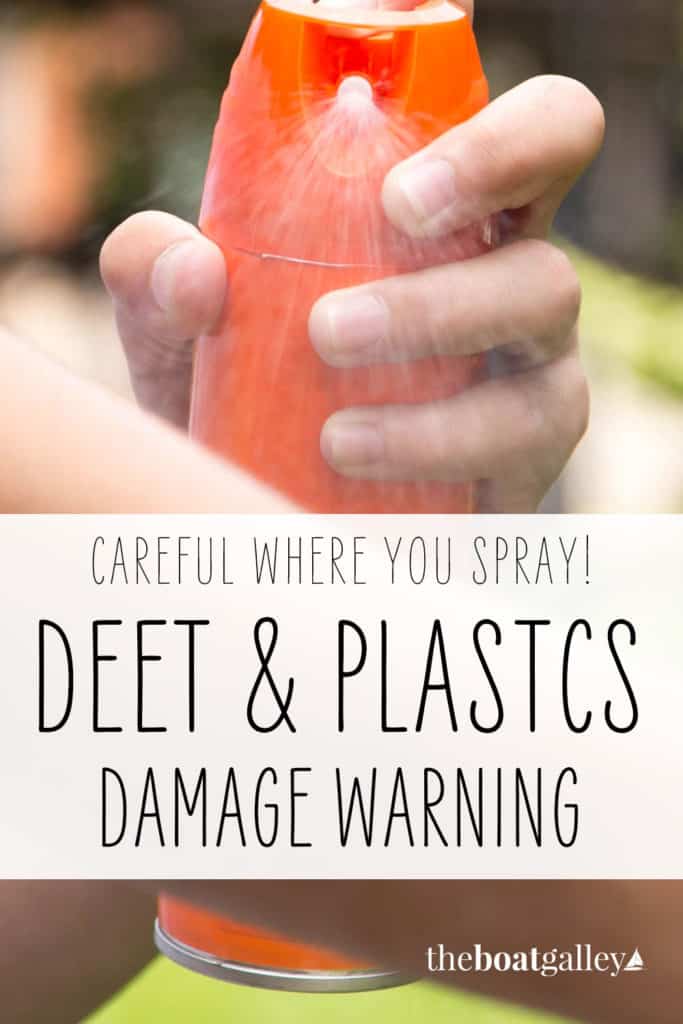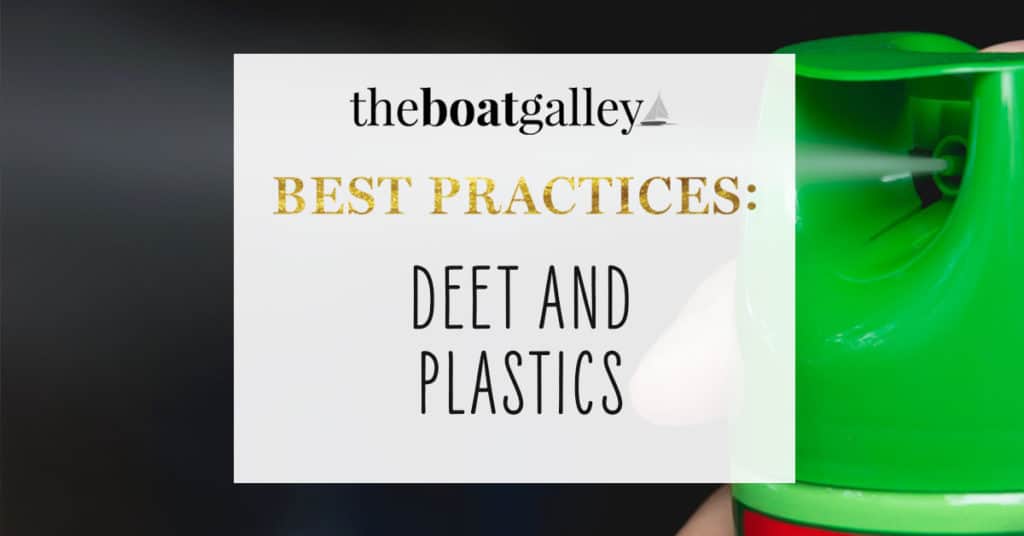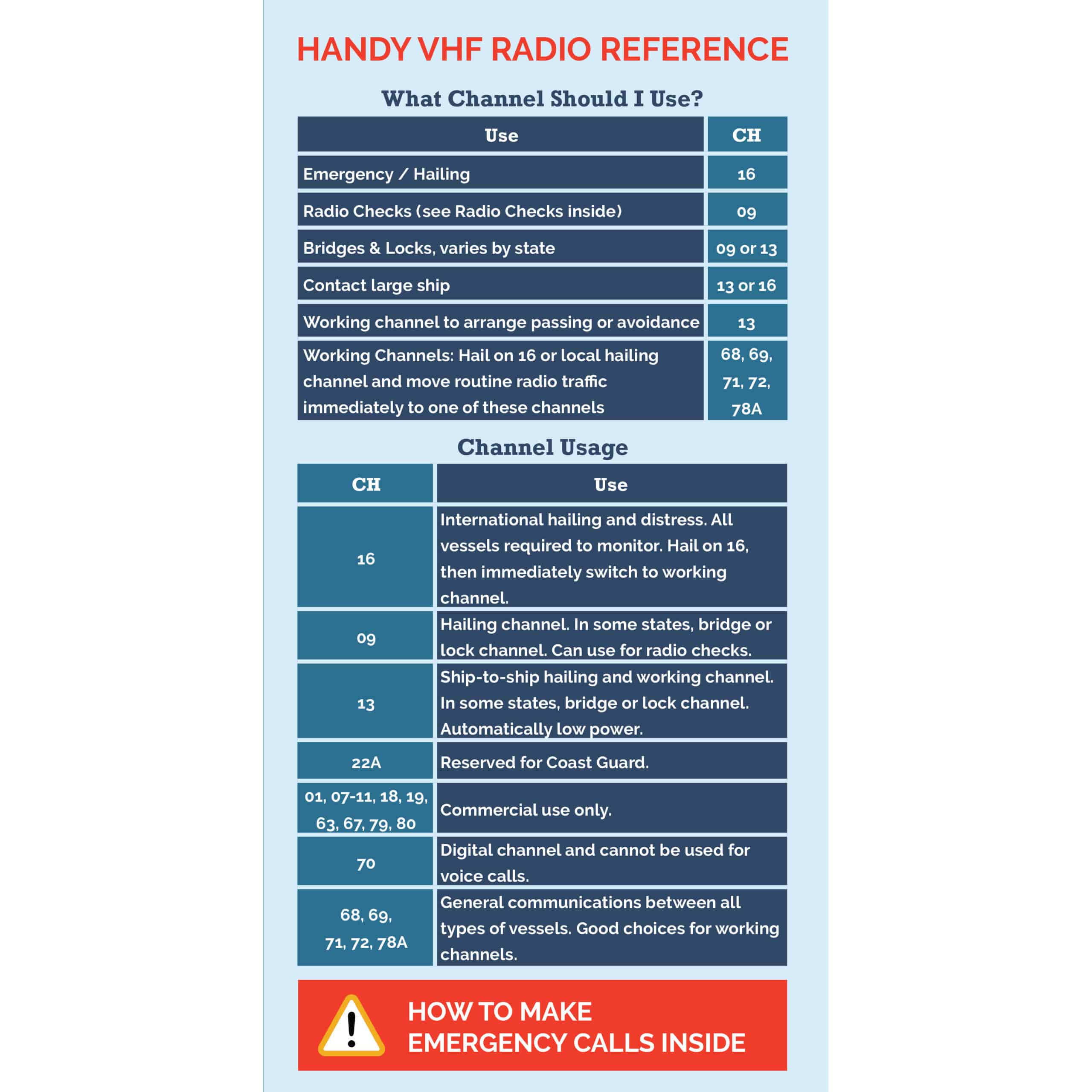
Are you aware that DEET and plastics do not play nicely together?
If you use bug spray that contains DEET, be very careful where you spray it. DEET will melt plastic glasses and plates, watch crystals, and the plastic cases and screens on many boat electronics.
I managed to wipe out our GPS display, my watch crystal, and put spots on a couple of plastic wine glasses all with one unthinking spritz. The GPS, a handheld at the helm, had to be replaced (OUCH!).
I’ve had it melt a plastic water bottle and there are a couple of glasses aboard Que Tal that ended up with swirly fingerprints in the plastic. A friend had it leave marks in the globe over their compass. Another friend left some marks on the cockpit mike for his VHF.
It doesn’t destroy all plastics (heck, it usually comes in a plastic bottle), but always err on the side of caution around anything that is plastic when you’re spraying DEET or when you might have some on your hands.
A recent newsletter subscriber mentioned that it even melts nail polish!
Even if you don’t use it, a guest or friend on a trip ashore might. Their overspray could get on something of yours . . . and cause damage.
Whether you use bug repellant with DEET is a personal decision — I know that many people don’t like it. In general, we don’t use it . . . unless we’re in an area with a serious malaria, dengue, West Nile, or other mosquito-borne illness problem. Then it seems to be the lesser of two evils.
There are some good alternatives to DEET-based sprays, although they are not quite as effective:
- No Natz is a good product without DEET to keep gnats and no-see-ums away, too.
- No Mosquitoz (a sister product of No Natz) does a good job, too.
- You can make less-damaging bug spray yourself but it’s not as powerful as No Natz/No Mosquitoz.
I’m not intending this article to be a discussion of whether or not you should use sprays with DEET . . . but rather just a warning that if you do, or someone around you does, be exceedingly careful when spraying!
Flatten the learning curve with practical how-to info that gives you the confidence to step into life aboard.
Start Learning Today

Carolyn Shearlock has lived aboard full-time for 17 years, splitting her time between a Tayana 37 monohull and a Gemini 105 catamaran. She’s cruised over 14,000 miles, from Pacific Mexico and Central America to Florida and the Bahamas, gaining firsthand experience with the joys and challenges of life on the water.
Through The Boat Galley, Carolyn has helped thousands of people explore, prepare for, and enjoy life afloat. She shares her expertise as an instructor at Cruisers University, in leading boating publications, and through her bestselling book, The Boat Galley Cookbook. She is passionate about helping others embark on their liveaboard journey—making life on the water simpler, safer, and more enjoyable.










PacificSailors on Facebook says
Yikes! Didn’t know that. Thanks!!
Alicia says
Try Oil of Lemon Eucalyptus (OLE) based products instead. They are registered with the EPA and work just as well as 20% DEET products, but won’t harm your gear. Cutter, Repel and Coleman all have OLE products that can be found at stores such as Wal-mart and Target, sporting good stores and on-line.
ben says
Best stuff I’ve ever used, hands down, was called ‘mosquito soap.’ I got it from a friend who presumably got it in the Phillipines. Main ingredient was permethrine, which watered down and sprayed on clothing was also amazing. 3 applications of the soap on my skin and I didn’t get a bite for about 3 years. I’m not sure if it’s legal in the US but I’ll be shopping for some before I set sail.
Penny says
We learned about this the hard way too and smudged up some plastic wine glasses and a Tervis Tumbler. I had made some no see-um spray with half water and half Skin so Soft and it ate through the plastic spray bottle I put it in, so not just Deet will eat through some plastic.
Found a great natural product on line called No Natz that is great for no see -ums.
Stefanie says
Deet is painful on my sensitive skin, so I use products with picaridin. It’s as effective as DEET and easy to find at stores.
Stacey says
Years ago, I watched a friend accidentally got some in her eye…….It melted the plastic contact lens right out of her eye. Awful experience.
Ann says
Catnip is 10x more effective than DEET and while it doesn’t smell great, I think it doesn’t smell terrible. You can add the oil of lemon eucalyptus to make it smell a little bit better and geranium oil is good to repel ticks. I get a bug spray from a friend who makes it with catnip and it’s never failed me against the HUGE mosquitos we have in the Adirondack Mountains.
Julia says
Catnip you say? Interesting. Love your blog Carolyn! Isn’t it crazy that we put shit on our skin that will melt plastic!? I mean, we absorb into our bodies what we put on our skin! I say if I can’t eat it, I don’t want to rub it all over myself! Natural is always better! Taking a high dose of B complex vitamins can work too. It’s the B1 they don’t like, plus you get an extra boost of water soluble vitamins that most people are low on since sugar and stress deplete them.
Ann says
Actually, the B vitamins help to restrict the reaction we have to them. I was taking vitamin B6 for carpal tunnel and found that while I was being bitten, I wasn’t getting the huge welts and itchy bites like I normally do and found out it was because of the B. A good B complex and vitamin C make it so that you should not react to bites much if at all. 🙂
Yep – Look up the catnip – it is an amazing substance!! There are a bunch of catnip bug sprays out there. I get mine from Dreamseeds on Hyenacart (you can google that and find her fast). Actually, I get a ton of stuff from Dreamseeds – soaps, bug spray, salves and creams. Kris is fantastic and will help you work out what you need. My daughter is going to Cuba in August and she made her a special bug spray for that trip.
Jan Bogart says
Chikungunya is back here. I got it last Oct., and still have symptoms,. Wish I knew about this last year.
Jan Bogart says
Oops, sorry, read in comments about mosquito soap……
Diane says
We are using Young Living Essential Oils to replace as many as possible of the chemicals on our boat. They are extremely cost effective, easy to store, and do the jobs we ask of them better than the chemical laden ones. They smell really nice too!
Lupari Sue says
Thanks for the heads up Carolina. Good advice as usual.
Rebecca Tommaseo Ponzetta says
Luigi Tommaseo Ponzetta no deet on JOL!
Lupari Sue says
Thanks for that information. I never knew it was so potent.
The Boat Galley says
Yeah. It’s good in places with malaria, dengue, zika, etc. to protect you, but it’s nasty on plastics. We use as little as possible since we have the world’s lickingest dog, but sometimes we have to . . .
Lupari Sue says
Yes I understand. We are in SE Asia and are aware of potential mozzie borne diseases, which we definitely do not want, but we use it judiciously, maybe a bit more careful now with where we put our hands. Mostly we use roll on or pump pack so spray over is minimal anyway.
Steffanie Johnston says
Can you just imagine what it does to your skin … you body?
The Boat Galley says
I don’t like it but sometimes it’s better than the mozzie illnesses.
Travis R DeLong says
As a Rock Climber and Construction worker I never use deet. It will damage safety equipment (harness and rope).
Susan of Rock Island says
Great advise Carolyn per usual! I had no idea since we go all natural on Rock Island. With that said, I too would choose Deet over a crazy disease that might kill me before the cancer or sickness Deet may cause down the line. I could get more cruising in! Lol
Not to make light of any disease or cancer but I too believe Deet has a time and place for use when I may not trust my essential oil creation, even when well researched and works great here in the states. Thanks again Carolyn
Florian Wolf says
Picaridin is as effective / mozzie-repelling as DEET, but doesn’t have the greasiness and irritation potential on / for your skin. See here:https://www.outdoors.org/resources/amc-outdoors/outdoor-resources/picaridin-vs-deet-which-is-the-best-insect-repellent/
It is available as sprays & lotions, personally I prefer the lotion, as you can better direct where the formulation is supposed to go and there is no risk of ‘coughing in the mist’. It also doesn’t dissolve plastics, although that may also depend on the formulation. Products from well known brands are normally tested for this.
While I worked for Bayer while picaridin was developed, tested & launched I have no affiliation to them anymore. However, even comparing the efficacy studies from an independent point of view it is clear that picaridin matches DEET in efficacy & longlastingness, but has better ‘cosmetic’ properties – doesn’t burn, smell, or smear, as DEET does. There are also some studies published that DEET may be neurotoxic; none of that could be found for picaridin.
So, read the label on the back of the bottle / can, and then decide for which one you go !
Paula Biles says
Another BIG disadvantage of some sunscreens is that they contribute to killing corals when you swim with them on. Hawaii is considering banning them because of the severity of this problem.
Carolyn Shearlock says
Yep, I learned about that before a trip to Hawaii a number of years ago. Our favorite non-damaging sunscreens here.
Florian says
Not all of them do that, but some. Do your research on the web and look for “estrogenicity” or “endocrine disruption” in relation to your actives in the sunscreen. In general pigmentary sunscreens (those ONLY containing Titanium dioxide and / or Zinc oxide) don’t do this and are also the safest for your kinds.Their drawback is a sometimes pasty consistency, but “in visible zinc” gets you around all this as well.
Lindy says
Deet can also damage varnish. We sprayed it on our bug screens that are metal screen mounted in wood, varnished frames. It left spots of bubbling varnish on the frames and hatches. So frustrating, we were trying to avoid putting it on our skin, but keep the mosquito from getting in the boat!
Patricia Jackson says
Good reminder. The first time I used but spray with DEET was in New Zealand..our coach driver passed it out…and it put my fingerprints on my camera.
JonandMiriam Brown says
Oh wow good info! I didn’t know!